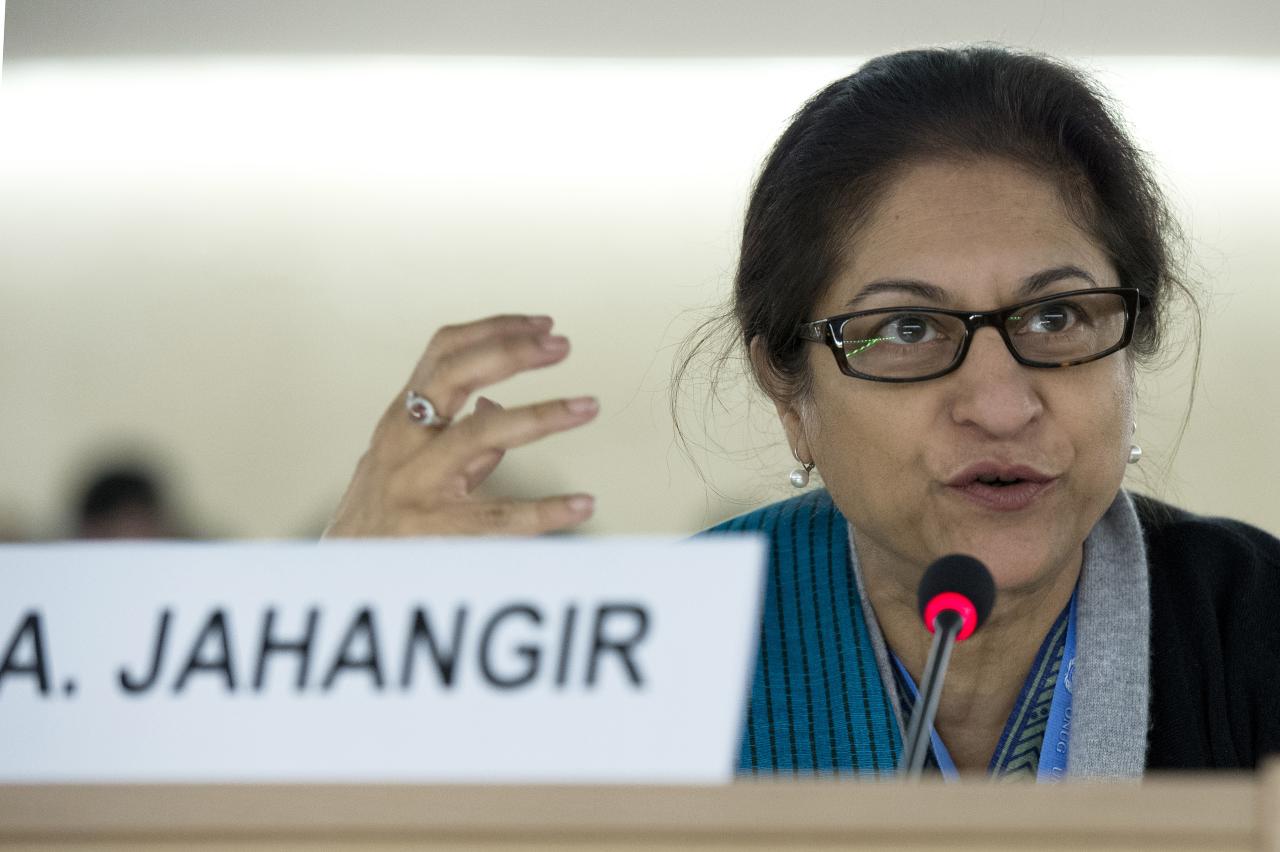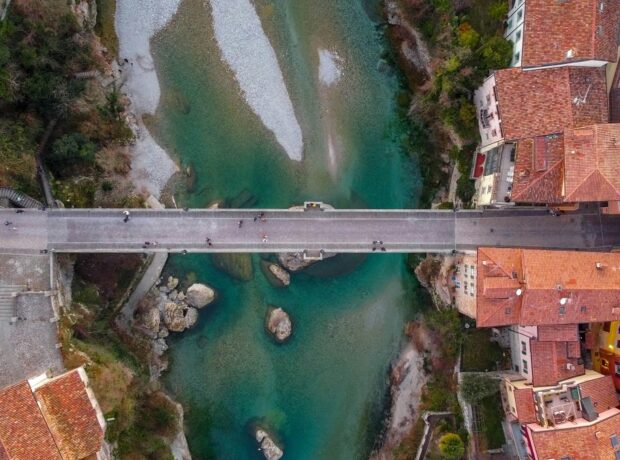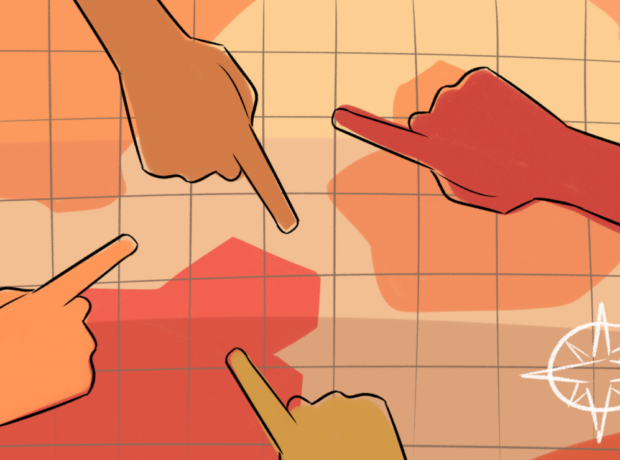As the world mourns Pakistani social activist and human rights lawyer, Asma Jahangir, Arjumand Bano Kazmi shares her experience of meeting Jahangir in her office in Lahore. This interview reveals Jahangir’s feelings about NGOs, international funding and democratisation in Pakistan, but also highlights the humanist nature of this unforgettable woman.
It was the midst of June. Nearly four in the afternoon but the heat and humidity of Lahore was still intensifying. Standing outside a modest commercial building in Lahore, I felt smothered, not because of the heat, but because I was finally going to meet Asma Jahangir.
It had taken me over a month to set up a meeting with her. Her office assistant kept apologising for making and then cancelling the appointments mainly for the unexpected turn of events and commitments that Asma had to attend. But at last, there I was, hot and nervous as I entered the building.
Asma’s was an unassuming office, three small rooms and a big common room, all visible through cheap glass doors. I saw Asma, behind the glass door of one of the smaller rooms. Her assistant opened the door and softly announced me.
A petite woman promptly stood up from behind a busy and messy looking desk. Dressed in an inexpensive shalwar-qameez with a dupatta casually held across her neck, Asma looked the same as any other Pakistani urban woman in her 60s: short hair loosely tied at the back, a small chain with a single pendant around her neck, and pensive eyes behind thinly framed glasses.
We shook hands and I sat down on the chair across from her.
“Arjumand, your research looks interesting” she said in Urdu. “How can I help?”
I was a bit astonished. I was not expecting such a candid, welcoming and direct response from one of the most well-known human rights activists, for whom I always held high respect and considered as a role model.
I explained that my research was about exploring the roles of internationally funded NGOs in democratisation. Since she was leading an NGO with an aim to promote democracy and human rights and had long been involved in pro-democracy resistance movements, I wanted to hear her observations and concerns as she had experienced them over the years.
“The role of NGOs in the context of Pakistan has been extremely positive and important” she began, this time conversing in English. “Civil society has always been here in Pakistan before the conventional kind of NGOs that have come in now. These were introduced in the 80s.
One of the reasons that in a Muslim country dogmatic Islamic discourse has been resisted is because of this civil society.
“What I call civil society, are poets, writers, union of journalists, trade unions, legal community, people who are liberal in their thought, who may or may not get together to form certain organisations. Even political parties are part of civil society in Pakistan. Pakistan has survived because it has political parties.
“But our state has never recognised this civil society. Nor do they recognise us now. They tolerate us because of international pressures. They are compelled to involve us in developing the progress reports to the CEDAW Committee at the UN.
“But by and large, since the Ayub era, there has been a regulated effort to hegemonise this civil society including curbing the development of political parties. So to this day, state does not communicate with us.
“It makes laws and introduce policies without any consultation, so we have been essentially kept at a distance. In a democracy, it is important that everything done in terms of the law and law-making, should not just be thoroughly discussed in the parliament, but also outside the parliament.
“In the colonial times, people were asked to give their opinion and the same should happen now. But, except for the businessmen who are consulted discreetly before the budget is announced or a finance bill is introduced, nothing else is done.
Laws are made without consultation of lawyers; education policy is made without consulting with educationists and so on. So, we are kept at the margins.”
Suddenly the door opened with a knock and her assistant entered with a serving trolley carrying covered food trays. Asma slightly nodded and began to clear her desk making space for food. “You will have to excuse me. I have not had any lunch. And I am advised that I must not miss my meals.” .
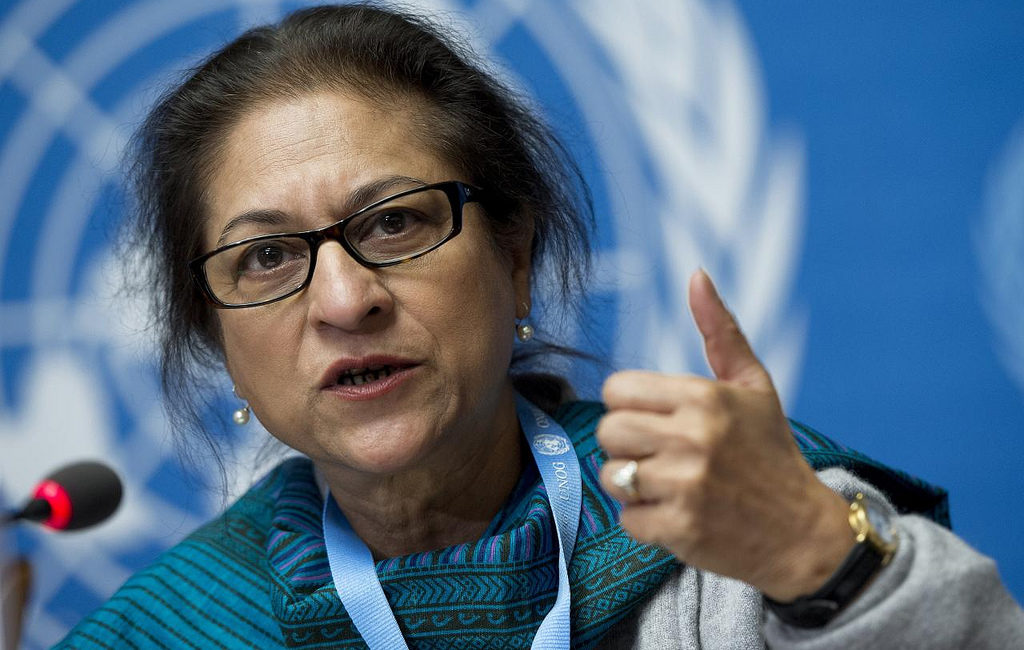
Image of Asma Jahangir by UN Geneva
Asma resumed talking. “So, I was saying that despite this discouraging, in fact hostile attitude of the state, we kept demanding to be heard. We kept scrutinising them, even the dictators, for failing to deliver basic needs and security for our people. Women’s rights organisations have, in particular, played a laudable role.
“I remember that back in the 80s we broke down the framework that they were creating for women. We were few of us as a network, but we managed to jolt people not just in Pakistan but even the international community started asking questions in their capitals against Zia [ul Haq]’s Islamisation laws.
Much credit should be given to the feminists of the West. They came to our rescue defying their own governments who were supporting Zia’s jihad in Afghanistan. A global pressure was generated, and a public outcry compelled the dictator to back off. In this way, the Western civil society played a significant role.
We have had people like Habib Jalib and Faiz among others who are institutions in themselves. They have given life, thought and progressive mind-set to many of us. They too were sheltered by the West and its civil society, when placed in exile by our state.
So, for me, civil society in Pakistan has been organised, dynamic and daring. It has been guided by the values of democracy, participation, fundamental freedoms for citizens, protection and advocacy for the rights of minorities.”
While speaking, Asma began to share food, serving me everything that was there at the table.
“What do you think of these new NGOs that are internationally funded for defined projects and programmes? Do you think they are doing what you as an activist used to do or still do?” I asked.
“I consider them non-conventional NGOs as they are different from NGOs in the past” Asma said. “I am not against international support. Western civil society has always supported our civil society for pursing democratic aims. They also pressurise their governments, so their governments are compelled to support us and pressure our state to have a democratic set up.
I am also not denying that the West is often guided by its own vested strategic interests. True that the West had supported the most formidable dictatorships in Pakistan. Nonetheless, their financial and issue-based support is extremely valuable for our civil society to make even little stitches in the torn fabric of our socio-political experience.
“It has to be our own judgement with which we should balance our priorities. Our organisation is funded by the Western partners – both by the state and civil society institutions. But we set our own agendas. I would not say that all NGOs set their own agendas. Some may have their funding agencies’ agendas, I cannot deny that. But that doesn’t just happen in the civil society.
“Our state – including government and the army – follows foreign agendas when compelled to in exchange for financial rewards, so how can they blame us? Just because they have been given legitimacy by their institutions doesn’t mean they are beyond the bounds of scrutiny.
“It is all because of this historical hostility against the civil society that we face the charge of following foreign agendas. I simply laugh at these charges. As if our society and state is completely innocent of not taking any external influence.
“But I do think that present day NGOs should have a common sense and not poor-judgements. They must understand that in Pakistan, the work they do is political to its core. And they should openly accept that. They should work alongside political parties to develop a critical mass but keep their distance from them by not directly engaging and playing a political role.
“They must work collectively and develop what I call ‘collective wisdom’ for liberal values. There must be deep knowledge: I think that an NGO that does not have deep knowledge of its own society is not helpful to democracy.
“I’ll give you an example. When General Musharraf came to power, if you look at the newspapers of those days, and I wish you would, apart from the HRCP [Human Rights Commission of Pakistan], not a single NGO opposed the military dictatorship. The reason being that they thought liberalism can spring out of the barrel of a gun. There is the contradiction.
“The people at HRCP have for years stood up against dictatorships. They have spent years in jail. They had taken the beating on streets and their members were killed by the establishment. They know what the barrel of a gun is like. So, we must learn from them.
NGOs should be able to differentiate myths from reality. I would say that what is most important for an NGO is to gain respect of the public that they are addressing. To find such respect in a society in which NGOs are under attack is not easy. But who said our work was supposed to be easy?
“A few welfare organisations in Pakistan managed to achieve this status such as Edhi. HRCP is also respected to a certain extent. But the rest of NGOs, I don’t see them taking positions as openly as they should.”
“From where do you get your funding?” I asked.
“Norway, Netherlands, Denmark, EU and other European countries. But we set the agenda. We do not take funding from the US – directly or indirectly. We don’t even take funding from the private citizens of America. We have a distinct worldview.
“Many NGOs in our community do not subscribe to our secular liberal worldview and keep their distance from us. That is all fine. We have nothing against them. But I do believe that civil society is only civil if it does not have criminal aims.
Our society is fast becoming a violent place. Dissent is not accepted here. The right wing is soaring. We all have to fight religious extremism together for our survival.
“I have to say that in a culture where tolerance, equality, and freedom of expression are heavily restrained, NGOs have taken up important issues to advocate. If they were not there, there would be no freedom of expression and no talk of taboos in this country. I believe, in fact I know, that there is no option for this country’s survival but democracy.
“There has never been a moment in time when even 200 people got together to bring in military. If military has ever been called in, it was done by our weak civilian governments, not by the citizens of Pakistan. This is where NGOs should direct their efforts to. To keep in check the governments that they do not resort to calling for the military rule.”
“What makes the approach of your NGO, AGHS, different from other NGOs in democratisation?” I said.
“We make demands from the government and if the government asks us to come anywhere to speak or inform their approach, we never refuse. We reserve our right to criticise, as we should do.
“Our work is primarily awareness and advocacy for the people who cannot speak for themselves. We also do not ‘train’ parliamentarians or do leg-work for them. We consider this service delivery, and we don’t have resources for it. For example, in the making of the 18th, 19th and 20th Constitutional Amendments, we advised when consulted upon. Most of our demands were not addressed.
“For example, on judicial appointments, we pushed for the parliamentary oversight. The CJP [Chief Justice of Pakistan] refused to accept this and now the Chief Justice is the sole authority for the appointment of judges. This is why, historically our justice system has been influenced by the establishment.”
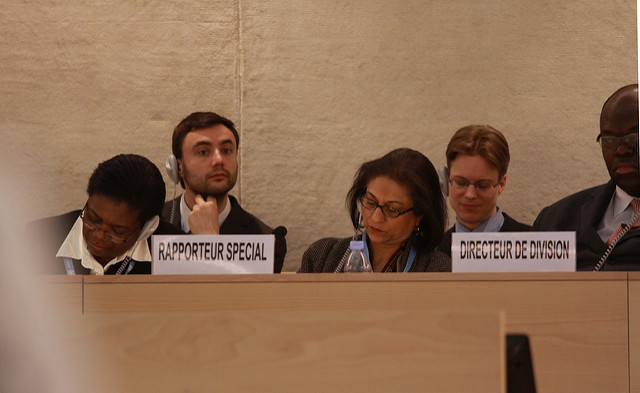
Image of Asma Jahangir (centre) by United States Mission Geneva
I asked whether NGOs should have any role in law-making. Asma said: “I don’t think NGOs can be given a formalised role. There should always be input from them and there are ways for doing that. You have to lobby and ensure that your input is considered. When there was the draft going around of the 18 Constitutional Amendment Act for consultation, to my utter surprise, only a handful of NGOs responded. But the idea that you should be given a formal role is absurd.
“Why should you be given a formal role if people have not elected you? Whom do you represent? If you represent an idea then give that idea and let the parliament decide.
“With all my respect to those NGOs who do the leg-work for politicians in drafting laws, I would say please have those laws vetted by lawyers. You simply cannot be experts in everything that you manage to get funding for. Just because you can speak English, you cannot understand the legal system of this country.
This naivety or opportunism – whatever you want to call it – takes its toll as laws get drafted which contradict the previously made progressive laws. Who suffers – it is the public and those progressives who struggled to lobby for those laws. This is why I say that NGOs’ poor judgement is dangerous.”
“What do you say about volunteerism that’s disappearing fast and is a big concern for our NGOs?”
“Since when have we turned into these bureaucratic bubbles which are required to have three to five years strategic plans? If you have too much bureaucracy you cannot work in a country like Pakistan where there is crisis every day. I will not be able to tell you today what I am going to do tomorrow because I am not a master of things.
“Plus NGOs should stop thinking that they know everything. That they can train the police without reading the police laws!
“And finally on volunteerism, I strongly believe that NGOs should nurture it and the conventional tutorship from senior NGOs’ experts to young volunteers and staff members must continue. There has to be some commitment to what we do and stand for. The amount of money NGO personnel are paid these days, breeds corruption and opportunism in my opinion.”
I left Asma Jahangir deeply impressed by her strength of purpose and her reflective rebelliousness. Both are attributes we will surely miss with her passing.
- For content like this direct to your inbox each month, subscribe here
Featured image by UN Geneva.
